
Table of Contents
In the travel industry, online reviews are crucial for your business’s success. But negative reviews can harm your reputation and deter potential customers from booking with you. If your travel business has received a bad review on Google, it’s essential to respond professionally and effectively. In this chat, we’ll cover tips and strategies respond to a bad Google review and minimizing their impact on your business. By the end, you’ll know how to handle negative reviews and turn them into opportunities for growth. Let’s get started!
According to Tripadvisor, 80% of tourists check at least 6 to 12 reviews before booking. That’s why tour operators now are racing to get more online reviews to increase booking rates.
You get good reviews. Congratulations! But what if you get bad reviews on Google? Will it immediately collapse your business or even save the quality of the travel services you offer?
Before completely giving up on a brand, over 90% of customers will give it the second chance. It all comes down to how you respond to them! So, don’t pass up this chance to leverage bad reviews to build trust and improve your travel agency’s reputation.
In today’s post, you will learn how how to respond to a bad Google review for travel industry.
Understanding Negative Reviews
Types of negative reviews
Negative comments can come for a lot of reasons. However, to classify the most common negative reviews in the travel industry, there are two types below:
Specific complaints about services
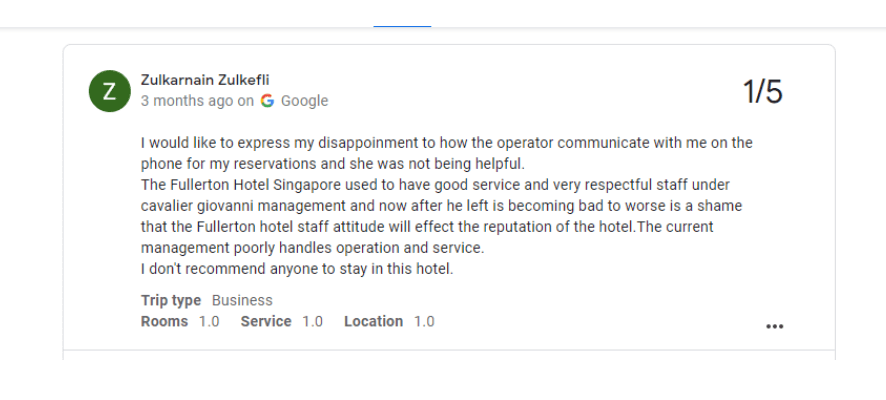
These negative reviews come from objective reasons for poor service provided by travel agencies.
Tourism services often include many small services combined. It is very common to come across a complaint about one of those services. That’s right, nothing is perfect. The apple has beautiful skin, but the inside may have a small hole in it.
Those complaints can come from flight delays or cancellations, poor hotel conditions, unacceptable staff attitude, the complicated booking process or even small something like no Wi-Fi room, etc.
General dissatisfaction with the experience
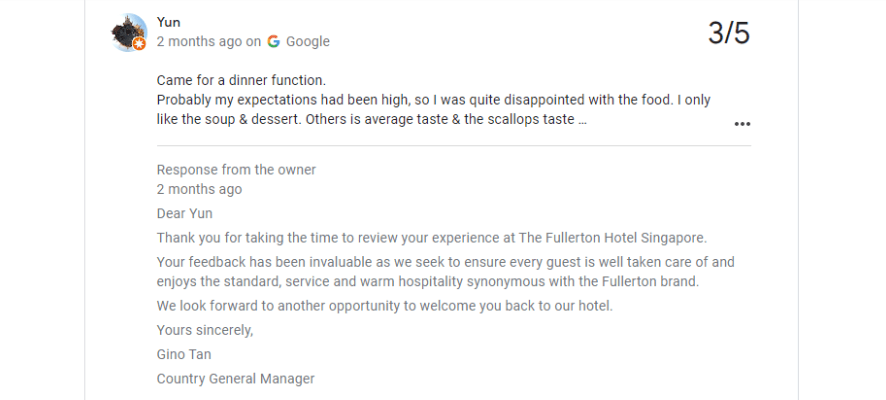
These negative reviews are subjective from tourists. Each tourist will have different experiences with the same travel service. So while there are satisfied customers, there are always high-demanding and scrutinizing customers in every aspect of the trip. And finally, leave a bad comment.
Causes of negative reviews
There are various reasons why people leave negative reviews of travel services online. But, the following three main points:
- Miscommunication: Going to a completely unfamiliar place, tourists will inevitably have a language barrier. Sometimes in communication with tour guides, hotel, and restaurant staff, etc, there may be misunderstandings, leading to an imperfect travel experience.
- Unmet expectations: This happens often. Generally, tourists have high hopes and expectations during every long-distance journey. Hence, it is very feasible to be dissatisfied with a service, an experience, or the entirety of a trip.
- Human error: These will be the problems that may occur in any phase from the time of booking until the end of the trip such as booking the wrong flight for tourists, check-in in the hotel too early causing extra costs, and so on.
Strategies for Responding to Negative Reviews
The majority of customers are much more likely to complain about poor service than they are to praise it. Thus, it is important for all tour operators to be conscious of the most typical complaints made by unhappy tourists and to know how to handle them in a respectful yet effective way.
Below we will show you 4 strategies to respond to a bad Google review:
Responding promptly and professionally
A prompt reaction is essential when responding to a negative Google review. Even though it might be very taxing to prepare a good response, you must respond right away.
This demonstrates to tourists that you care about their travel experiences, whether good or bad. You can also identify and fix service flaws as well as immediately address customer issues, gaining their future loyalty.
A visitor is more likely to remember your prompt response and support than the mistake once they have their troubles solved, or at the very least, are acknowledged as soon as they arise.
The sooner you respond to complaints, the more likely you are to make things right with them and convince anybody else who sees this review that you genuinely care about giving them a good experience.
Apologizing and taking responsibility
“The customer is always right” has been around for a while. A great tourism experience is frequently driven by this customer-first mentality.
Therefore, there’s no shame in having to say sorry to all (especially when you’re in the service industry).
Provide an apology for the circumstance that caused the customer’s bad feelings. Recognize any flaws you may have or places where you might do better.
The most important thing to remember is that they reviewed based on their feelings. Not as you see it, but what actually happened to them. A peaceful solution and protecting your professional image are the objectives of your response, never try to win a battle.
Finally, empathy is always the key, so show that you recognize and understand your tourists’ displeasure.
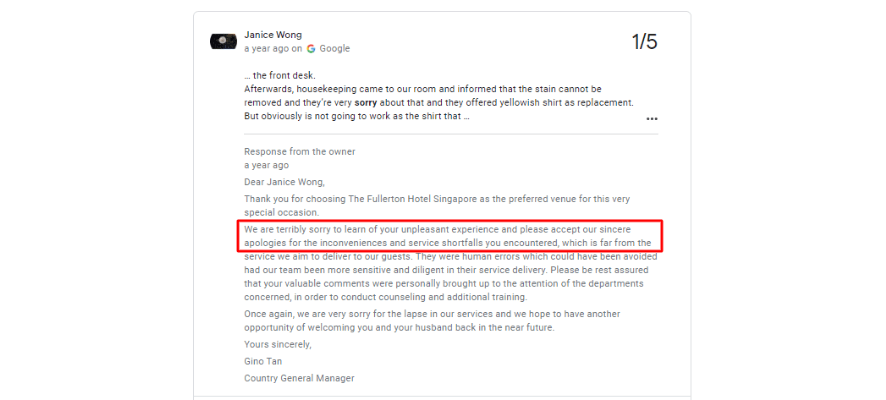
Offering a solution or compensation
You take accountability, which requires action. To please your customers, try to identify the root of the issue and propose a strong solution.
By giving compensation or discount, you may always appease dissatisfaction. If a customer was unhappy with the quality of your hotel room, you can give them a discount on a room in the same class or for their future stay.
If a solution has not yet been set, let the customer know that you are trying to find a way to make things better and you must take action to show your care.
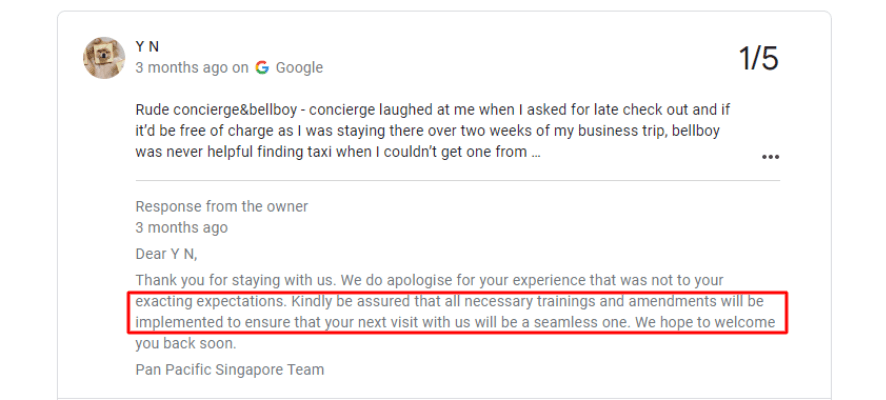
Encouraging the reviewer to contact the agency directly
A first reply is excellent, particularly if you provide a name, phone number, and email address for the customer to follow up with. This implies that you’re not just replying to protect your reputation, but truly are concerned with the result.
You can also ensure that customers know of the efforts you are taking to resolve their issues.
Furthermore, by communicating privately, you may prevent the disagreement from escalating and further eruptions of rage on the internet.
Simultaneously, don’t forget to share your solution on the website where the review first appeared. It’s crucial for other users to know that you can resolve conflict and that you value feedback from customers.
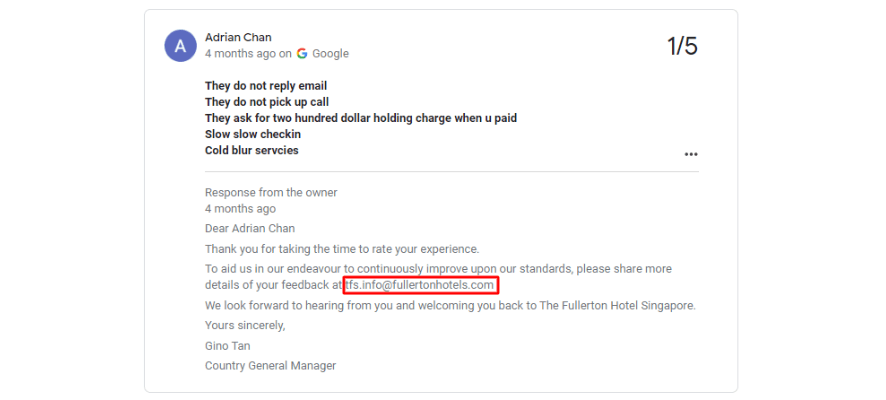
Email Example
Introduction
Your customer expects to be spoken to on a one-on-one basis and in a kind manner. Hence, be sure to provide a proper greeting and, if at all possible, avoid the generic “Dear Customer” or “Dear Guest”
You should say the reviewer’s name and use it to further personalize your answer. It is, “Dear [Customer’s first name]”.
Make it clear to customers that you value and appreciate their feedback. Never forget to express gratitude while responding to reviews.
These are some examples of how expressing gratitude may make a big difference:
“Thank you for your review. I’m sorry you had a bad experience, but I greatly appreciate you letting me know about this.”
“Thank you for taking the time to leave us a review. We value your opinions and rely on them to determine if we’re meeting your expectations.”
“Thank you for letting us know about this. Your feedback helps us make improvements. We are examining this problem in the hopes of finding a prompt and accurate solution.”
Apology and taking responsibility
Saying sorry demonstrates that you care about your consumers and are not too proud to admit your faults.
Keep your apologies brief, just like the rest of your response:
“We are truly sorry that your experience did not meet your expectations. This is our fault. Our customers are the lifeblood of our business. We understand your disappointment with [specific issue] given [what happened]”
Make no excuses. Assure them that you hold yourself to high standards.
Something you could say is:
“We always strive to provide a great experience, and we are gutted when we fall short. Thank you for taking the time to alert us to this. We will take the feedback to improve and guarantee that this does not happen again.”
Make things right
When responding to bad reviews, avoid canned replies that fail to fix any specific flaws stated in the review.
If there’s nothing you can do to make things right, here’s a good approach to react to the reviewer, accept responsibility, and commit to doing better in the future:
“I apologize on behalf of everyone at [Business Name]. Please know that your case was exceptional. As you can discover from other reviews, we are recognized for taking responsibility and genuinely caring about our customers. We can’t change the past, but you’ve got my personal promise to improve the way our team treats every customer. Please accept my sincere apologies on behalf of the entire team until then.”
Closing and inviting the reviewer to contact the agency directly
In your review response, you should include direct contact details for customers.
“We would appreciate the chance to further investigate your feedback. Could you please contact me at [Email Address] or our team at [Phone Number]? We will work with you to fix any problems as soon as possible.”
Managing Online Reviews
Engaging with positive reviews
Many businesses would rather let positive ratings speak for themselves than reply to negative feedback. Regrettably, this might be a squandered chance.
Interacting with positive reviews may increase customer loyalty by demonstrating that you respect both their company and their opinion. It also allows you to demonstrate your customer service skills.
Monitoring and responding to reviews regularly
The simplest way to keep an eye on online reviews is to set up notifications and reminders, which most review sites give at no cost.
However, you might take a more advanced approach by installing a professional review management tool or software to consolidate all of your evaluations into a single platform for simple access and communication.
P/S: In the travel industry, showcasing customer feedback is crucial to building trust with potential customers. We’ll be discussing WordPress travel themes with a review section, which can help you display customer reviews and build credibility. By the end, you’ll know the benefits of using a WordPress travel theme with a review section and some top options available at Travelerwp theme.
Using feedback to improve services
There is nothing more effective than improving quality in the first place before a problem occurs and you have to solve it. Take advantage of negative comments to re-evaluate the quality of travel services and make timely improvements.
Building and maintaining a positive online reputation
Customers who see several evaluations surface frequently will believe your company is popular and reliable. Thus, travel agencies should design their online marketing strategies with sustainability in mind.
Conclusion
Understanding how to respond to a bad Google review is essential for keeping a good business image and leveraging reviews. Never forget that your company is not branded by one negative review. A bad review might be a warning sign that your business has problems, but it can also be a great way of building a loyal following and maintaining a good reputation.
Therefore, don’t be frightened of receiving constructive feedback. Face it and solve it!
